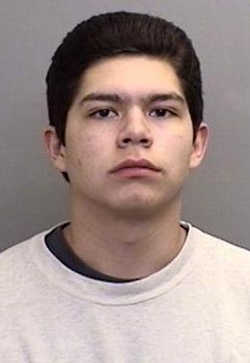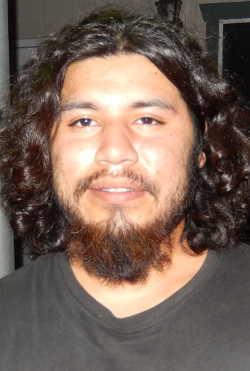LAKEPORT, Calif. – Following a three-hour hearing on Friday afternoon, a judge must now decide whether there is evidence to prove that a Kelseyville man – found not guilty by reason of insanity last fall in the shooting of another local man – has regained his sanity.
Retired Lake County Superior Court Judge Arthur Mann presided over the hearing in Lakeport regarding Andrew James Serrano, 42.
In October a jury found Serrano not guilty by reason of insanity in the September 2011 shooting of Willy Turner, as well as the assault at that time of his then-wife, Lesa, as Lake County News has reported. A story on the verdict can be found here: bit.ly/1vrBhF1 .
Prosecutor Alan Upton and defense attorney Mitchell Hauptman agree that such insanity cases are rare.
More unusual still are proceedings like Friday's, Upton said in a separate interview, explaining that the court must determine if Serrano has now regained his sanity, even before going to a state hospital.
“There is not a whole lot of case authority dealing with it,” Upton said. “It's an unusual situation in an unusual situation.”
Mann acknowledged that fact on Friday, noting at the start that it was “not your usual sentencing.”
Hauptman presented a case that included the testimony of two psychologists, Dr. John Podboy and Dr. Albert Kastl, both of whom had testified at trial on the defense’s behalf and examined Serrano before the fall verdict.
They told the court that after meeting with Serrano separately – each saw him for two hours – that they were convinced that he was no longer insane.
However, they would differ slightly in their conclusions about Serrano's current state of mental health, with Podboy saying he had no depression and Kastl opining that he had a mild depressive disorder.
Neither of the doctors interviewed medical staff at the Lake County Jail to verify statements Serrano made about his health or behavior, nor did they review previous reports.
“This is a premature hearing to have on this issue,” Upton argued at the hearing's beginning, noting that Serrano should be referred to a mental hospital or Lake County Behavioral Health for evaluation.
Upton did not present any witnesses on Friday, explaining that it had been the prosecution's belief that Serrano had always been sane anyway.
Mann said the penal code includes language that once there has been an insanity verdict it's up to a judge to determine of the defendant's sanity has been restored.
He said he couldn't operate in a vacuum in making that determination, so he would allow the defense to enter its evidence. In addition, Mann said he had read and considered a probation report on the matter.
Hauptman noted during the Friday hearing that the chance to consider Serrano's sanity at this point was “kind of a one-shot deal.”
Podboy opines on Serrano's mental health
Podboy had evaluated Serrano in February and March of last year for the not guilty by reason of insanity plea. He testified at trial that Serrano was insane at the time of the shooting and remained insane as of the time of the early 2014 interviews.
He would not meet with Serrano again until Hauptman asked him to reexamine Serrano to make a determination on his sanity. That led to a two-hour examination on Jan. 8.
In addition, Podboy met with Serrano's parents. “They felt that their son had much improved,” was no longer tremulous and had resumed calling them daily after having stopped for some period of time. “They were very pleased,” he said.
In addition, Podboy administered to Serrano a general screening test called the Miller Forensic Assessment of Symptoms Test, or MFAST.
During questioning by Hauptman, Podboy stated, “I didn't see any evidence of mental illness on the part of your client.”
He reported that Serrano had told him that he stopped taking his psychiatric medicines “cold turkey,” with Podboy noting repeatedly during the hearing that he believed Serrano had been “excessively medicated,” which was part of his problem.
He said that Serrano was a telemedicine patient, seeing a psychiatrist for five minutes at the jail and then being prescribed medications, but never seeing a psychiatrist face to face.
Podboy said he questioned Serrano closely about residual feelings of hostility toward his ex-wife, and Serrano said he has accepted that she left him for another man. He said he wanted to stay in touch with his children, stating he hasn't seen the younger children since September 2011.
In addition, Podboy maintained that Serrano showed no signs of being a danger to the public at large or his victims, with no tendency toward retribution and no delusional comments. He can understand right from wrong and understands the nature of the conduct that resulted in him being jailed.
On Jan. 9, Podboy wrote his report, sending it to Hauptman later that day.
Before the hearing started, Serrano's medical records were submitted to the court. In addition, there were records from the jail about Serrano's psychological condition. None of those records, however, were considered by Podboy in making his determination.
“You didn't think it was important to look at those before making that decision?” Upton asked, with Podboy responding that he didn’t consider them necessary.
Upton questioned why Podboy would rely only on statements from Serrano and his family and not on actual medical records and the health professionals overseeing Serrano at the jail. “Is that something a normal psychologist would do, acting under professional standards?”
Podboy said he didn't have access to those sources, and felt Serrano and his family were sufficient, adding that the couldn't imagine them fabricating their statements.
While Serrano had told Podboy he had quit taking his medications three weeks before their meeting, Upton presented information about a Dec. 29 mental health request that Serrano had made to jail staff to have his medications adjusted.
Serrano also had expressed to Podboy his plans to move to the Bay Area, live with his sister in San Pablo and get a job.
Podboy said the officers who had transported Serrano to his office told him they had no issues with Serrano, but Upton questioned why he hadn't checked up on Serrano's record in jail, pointing to a February 2012 fight between him and another inmate and a separate rules violation.
Following his meeting with Serrano, Podboy would report that he was back to being intellectually curious, was up on current events and sleeping well.
Serrano has a history of depression and if he has issues when transitioning back into the community, will seek help, Podboy said.
Upton countered, “That didn't work out so well the last time,” referring to a May 2011 mental health commitment Serrano underwent.
When Upton pressed Podboy on why he didn't do multiple tests on Serrano, Podboy said Serrano had been retested multiple times previously.
“But they came to very different conclusions didn't they?” Upton asked, alluding to tests that also found him sane.
“They did,” said Podboy.
Upton asked Podboy if Serrano was still reporting that he was hearing voices. Podboy said no, but acknowledged that he had not included that information in his report on Serrano's sanity.
Referring to an August 2013 report on Serrano's mental health from a doctor at Atascadero State Hospital, Upton referred to a passage in the report that suggested Serrano was exaggerating his mental health issues, or “malingering,” in order to minimize the criminal charges against him.
Podboy agreed during the cross-examination that malingering is more common in a legal context.
Responding to the report, Podboy said he would have to consider that opinion with a grain of salt, although he hadn't read it, and added that it appeared Turner was a “provocateur.”
Kastl shares conclusions
Kastl, licensed as a psychologist since 1968, said the two hours he spent with Serrano on Dec. 29 were sufficient to enable him to make an opinion about his current state.
Serrano, Kastl said, has a significant level of depression, which is not unexpected “given the daunting tasks that face him in the community.” He said 5 to 10 percent of the population has such serious depression at some point in their lifetime.
During his evaluation of Serrano, Kastl focused on three questions given to him by Hauptman: did Serrano have a mental disorder, does he understand the nature and quality of his acts, and does he present a danger to the health and safety of others.
Kastl held that Serrano poses no danger to the community nor “specific persons” – namely, his previous victims. Like Podboy, Kastl said Serrano understand the nature of his conduct, and has expressed remorse over the the acts he committed.
Asked by Upton about how long it was after the conclusion of the trial in October that Hauptman asked Kastl to evaluate Serrano's mental health, Kastl said it was a “few weeks,” or early December.
Kastl said Serrano no longer has a major depressive disorder, but a mild depressive disorder.
Upton asked Kastl if the fact that Serrano was no longer facing a lengthy prison term and had the possibility of release ahead of him had reduced his depression. Kastl said it was possible.
Some of the challenges Serrano is facing in his future include getting a driver's license and a suitable job, and hiring a divorce attorney to get visitation with his children, Kastl said.
“It sounds like there are a lot of plans for his future there,” said Upton, asking if Serrano shared those plans unprompted. “He mentioned these spontaneously,” said Kastl.
If released, Kastl suggested Serrano would need three months of weekly psychotherapy to transition back into the community. Serrano had indicated that his parents would pay for his treatment. As alcohol has also been an issue in his past, Kastl suggested he join Alcoholics Anonymous.
Kastl said he was confident that Serrano would not in the future commit the kinds of violent acts he has in the past, noting the stressors that precipitated that action are no longer present.
Upton suggested Serrano could be harboring secret plans for vengeance. Kastl said it was possible, but that Serrano's plans “seem to be oriented toward a productive future” rather than harboring feelings of retribution.
Would a person actually admit to having such vengeful feelings? Upton asked. Probably not, said Kastl, but such a person would have to be observed for signs of defensiveness and manipulativeness. “He was not of that stripe.”
Kastl said Serrano stated that he his hopeful that he and his ex-wife can resolve their differences and work constructively regarding their children.
In consideration of Serrano's violence against his ex-wife and Turner, who she has since married, Upton asked, “Doesn't that show he is still delusional?”
“I don't think so,” said Kastl. “It's a hope, a wish. He doesn't express it as a certainty and he realizes it may not be possible.”
Kastl said he had looked at Serrano's comments with skepticism. “This seems too good to be true. You have an illness and you get out of a lengthy incarceration period and suddenly you're acting normal. It seems unbelievable.”
Like Podboy, Kastl didn't speak to any of the health care professionals at the jail about Serrano's condition.
Kastl evaluated Serrano on Dec. 29, the same day he had asked for a medication adjustment while claiming he had stopped taking his medications. Upton asked how that squared, with Kastl responding that Serrano had told a nurse that he wanted to stop taking the medications. However, he didn't verify that with the nurse.
He said he did not review some 4,000 pages of reports on Serrano's case due to the extreme cost in time.
He also believed that it was unlikely Serrano exaggerated his symptoms in order to get medications, noting that the only people who seem to benefit from such medications are people with real psychosis.
Kastl said he used a Rorschach test on Serrano to look for signs of psychosis. He also tested his memory and concentration, and gave him another IQ test. Previously Kastl had opined that Serrano had a low IQ, which Upton suggested was remarkable given Serrano's background, which included working in a tech company.
In his December interview with Kastl, Serrano was more animated, whereas previously he had a more limited range of expression. “He just sat there like a lump.”
Even if he didn't get counseling upon release, Kastl didn't feel Serrano would be a danger to the community.
Attorneys argue parameters of the law
Following testimony, Hauptman summed up by pointing out that temporary insanity is a “recognized and well-settled concept.” He said the court was called on to make a preliminary determination and decide if there is probable cause for proceeding further.
He said the evidence of Podboy and Kastl met the evidentiary requirements regarding Serrano's return of sanity. Hauptman said the prosecution could have brought up contradictory evidence or made requests to examine Serrano.
Upton argued that Serrano hadn't recovered his sanity, and faulted Podboy and Kastl for “utter sophistry” and bias throughout the proceedings. “Many of the things that they were saying just flew directly in the face of common sense.”
He called the doctors “hired guns,” adding, “This is just highly, highly suspicious and unusual.”
Upton said the real issue is whether or not Serrano is still suffering from a mental illness, and asked that he be evaluated by someone else – “anyone else” – other than the two doctors, who he accused of engaging in verbal acrobatics.
Hauptman quoted case law establishing that once a person has been determined to recover their sanity, they become a 5150 and there is a civil commitment.
“There is no magic way to determine sanity or insanity,” Hauptman said, noting that Serrano was found to have recovered his sanity according to the only available definitions.
Mann asked Hauptman how he squared that conclusion with Kastl's testimony that Serrano has a significant level of depression in the form of a mild depressive disorder. Hauptman recalled that Kastl had said that level of depression is present in about 10 percent of the population.
Upton countered that the 10 percent of the population that had that level of depression hasn’t committed a crime and had a not guilty by reason of insanity defense.
“This is an area of the law that is not well defined and is very significant,” said Mann, noting it has been – and continues to be – difficult to get a handle on.
He said he would need to do further research and so continued the hearing to the morning of Wednesday, Feb. 4.
Email Elizabeth Larson at This email address is being protected from spambots. You need JavaScript enabled to view it. . Follow her on Twitter, @ERLarson, or Lake County News, @LakeCoNews.
























